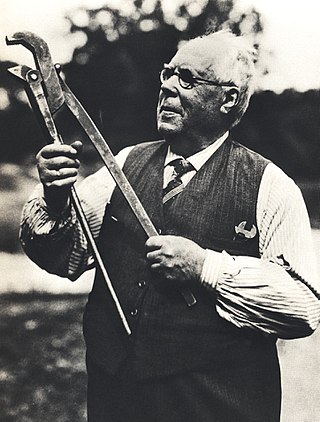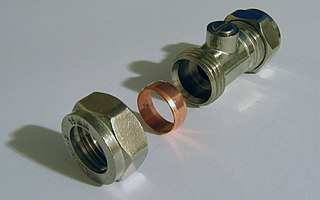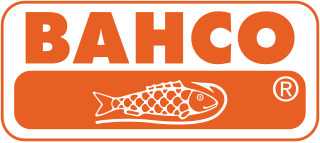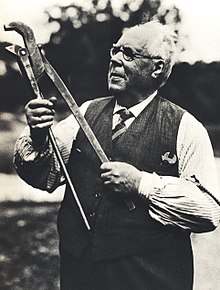
An adjustable spanner, shifting spanner, English wrench (Turkey) or adjustable wrench is any of various styles of spanner (wrench) with a movable jaw, allowing it to be used with different sizes of fastener head rather than just one fastener size, as with a conventional fixed spanner.

Plumbing is any system that conveys fluids for a wide range of applications. Plumbing uses pipes, valves, plumbing fixtures, tanks, and other apparatuses to convey fluids. Heating and cooling (HVAC), waste removal, and potable water delivery are among the most common uses for plumbing, but it is not limited to these applications. The word derives from the Latin for lead, plumbum, as the first effective pipes used in the Roman era were lead pipes.

A wrench or spanner is a tool used to provide grip and mechanical advantage in applying torque to turn objects—usually rotary fasteners, such as nuts and bolts—or keep them from turning.
A drain cleaner or opener is a person, device or product unblocking sewer pipes or clogged wastewater drains. The term usually refers to a chemical or mechanical utensil such as a commercial chemical product, plumber's snake, drain auger or toilet plunger. Occasionally, it is applied to a plumber or another individual who performs the drain cleaning and hygiene.

A monkey wrench is a type of smooth-jawed adjustable wrench, a 19th century American refinement of 18th-century English coach wrenches. It was widely used in the 19th and early 20th century. It is of interest as an antique among tool collectors and is still occasionally used in practice.

Pliers are a hand tool used to hold objects firmly, possibly developed from tongs used to handle hot metal in Bronze Age Europe. They are also useful for bending and physically compressing a wide range of materials. Generally, pliers consist of a pair of metal first-class levers joined at a fulcrum positioned closer to one end of the levers, creating short jaws on one side of the fulcrum, and longer handles on the other side. This arrangement creates a mechanical advantage, allowing the force of the grip strength to be amplified and focused on an object with precision. The jaws can also be used to manipulate objects too small or unwieldy to be manipulated with the fingers.

Johan Petter Johansson, sometimes known as JP, was a Swedish inventor and industrialist. He invented a modern adjustable spanner. He obtained over 100 patents in total.

A pipe wrench is any of several types of wrench that are designed to turn threaded pipe and pipe fittings for assembly (tightening) or disassembly (loosening). The Stillson wrench, or Stillson-pattern wrench, is the usual form of pipe wrench, especially in the US. The Stillson name is that of the original patent holder, who licensed the design to a number of manufacturers; the patent has since expired decades ago. A different type of wrench with compound leverage often used on pipes, the plumber wrench, is also called a "pipe wrench" in some places.

A compression fitting is a fitting used in plumbing and electrical conduit systems to join two tubes or thin-walled pipes together. In instances where two pipes made of dissimilar materials are to be joined, the fittings will be made of one or more compatible materials appropriate for the connection. Compression fittings for attaching tubing (piping) commonly have compression rings, called ferrules or olives, in them, and are sometimes referred to as flareless fittings. There are also flare fittings that do not require ferrules/olives.

A chuck is a specialized type of clamp used to hold an object with radial symmetry, especially a cylinder. In a drill, a mill and a transmission, a chuck holds the rotating tool; in a lathe, it holds the rotating workpiece.

A pipecutter is a type of tool used by plumbers to cut pipe. Besides producing a clean cut, the tool is often a faster, cleaner, and more convenient way of cutting pipe than using a hacksaw, although this depends on the metal of the pipe.
Cross-linked polyethylene, commonly abbreviated PEX, XPE or XLPE, is a form of polyethylene with cross-links. It is used predominantly in building services pipework systems, hydronic radiant heating and cooling systems, domestic water piping, insulation for high tension electrical cables, and baby play mats. It is also used for natural gas and offshore oil applications, chemical transportation, and transportation of sewage and slurries. PEX is an alternative to polyvinyl chloride (PVC), chlorinated polyvinyl chloride (CPVC) or copper tubing for use as residential water pipes.

A vise or vice is a mechanical apparatus used to secure an object to allow work to be performed on it. Vises have two parallel jaws, one fixed and the other movable, threaded in and out by a screw and lever.

Irwin Industrial Tools is an American manufacturer and distributor of hand tools and power tool accessories. It is owned by Stanley Black & Decker. It is best known for producing Vise-Grip locking pliers. Additionally, it produces clamps, drill bits, taps and dies, screw extractors, bolt extractors, saw blades, pipe wrenches, screwdrivers, snips, and other construction tools.

A fitting or adapter is used in pipe systems to connect sections of pipe or tube, adapt to different sizes or shapes, and for other purposes such as regulating fluid flow. These fittings are used in plumbing to manipulate the conveyance of fluids such as water for potatory, irrigational, sanitary, and refrigerative purposes, gas, petroleum, liquid waste, or any other liquid or gaseous substances required in domestic or commercial environments, within a system of pipes or tubes, connected by various methods, as dictated by the material of which these are made, the material being conveyed, and the particular environmental context in which they will be used, such as soldering, mortaring, caulking, Plastic welding, welding, friction fittings, threaded fittings, and compression fittings.

Locking pliers are pliers that can be locked into position, using an "over-center" cam action. Locking pliers are available with many different jaw styles, such as needle-nose pliers, wrenches, clamps and various shapes to fix metal parts for welding. They also come in many sizes.

A basin wrench, sometimes called a sink wrench, is a plumbing tool which is used in confined spaces to turn fasteners and pipes that would be difficult or impossible to reach with a plumber wrench or other types of wrenches. For example, the threaded nuts used to secure faucets to sinks are often located in deeply recessed places that can only be accessed with a basin wrench.
Channellock is an American company that produces hand tools. It is best known for its pliers—the company manufactures more than 75 types and sizes of pliers—particularly its eponymous style of tongue-and-groove, slip-joint pliers. Its pliers have distinctive sky-blue handle grips; the company has been using the same trademarked shade of blue since 1956.

Tongue-and-groove pliers are a type of slip-joint pliers. They are also known as:

Bahco is a Swedish brand within the hand tool industry, which is now part of SNA Europe, part of Snap-on. Its roots go back to the industrial revolution in Sweden in the late eighteen hundreds, starting with innovations such as the pipe wrench and the modern adjustable wrench. Since then, the product range has expanded with a total assortment of products that today includes over 7000 hand tools.



















